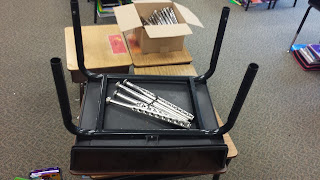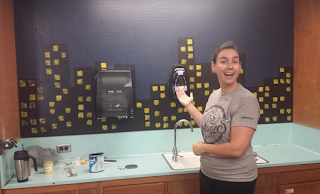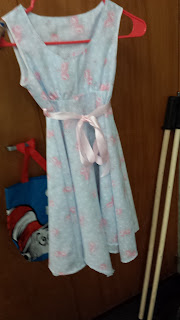Some may say that I have delusions of grandeur. An out of control ego.
Nothing of the sort.
I just want to remake my world in mine own image is all.
This isn't technically true (though it makes for a fun lede). I am more interested in remaking the world in the way that best suits my students. My world, our world, is the classroom we share. It's where we spend most of our day, our home base, our home. Certainly feels like I live there sometimes. It's where I expect my students to learn and be comfortable and form a community. Yet it's trapped within certain constraints. I can't make it physically larger, the walls are pretty stuck. I can't do anything about the built-in storage space. I can't knock a wall out for another window. I have so little control about so much with regards to the learning space of my students.
Yet, I have taken as much control over it as I can. I should preface this with the note that I have a
very open-minded principal who trusts that there's a method to my madness and who allows my foolishness to take place in her school. She doesn't have to and I'm sure there are many reading this who don't have such a forgiving environment. This is my fourth school over my eleven year career and I think it's the first one where I'd have been allowed to go this whole hog. Maybe in Hawaii, where I spent most of my six years in a portable so far from the office students would need a snack and a water bottle to take up a note. I also want to note that I didn't ask permission to do any of this. I don't know if that makes me a bad role model for other teachers or not, but I do a lot based on the belief that it will be better for the kids, they'll be enthusiastic about it and it'll positively impact their learning. If my changes accomplish those two things, I figure it's harder for even the most stick-in-the-mud administrator to make me change it back. But I don't know your admin, maybe s/he's more stuck in the mud than most. Still, give over my email, I'm happy to chat. Why not?

My changes started two years ago. I wrote about it
here, so here's the short version- I was having a rough year and so were my kids. We needed to mix things up and I was willing to try anything. So I took the legs off almost all the desks, the ones I didn't I either left the same or raised up as high as they would go. I went to Goodwill and bought pillows and built my first Donors Choose to get beanbag chairs, wobble stools, and backjack chairs. And it worked. My kids loved it, it totally changed the environment in my class.
It made the flexibility I was seeking in their attitudes physical.
That was my last year at that school. After getting hired at my new (and current) school, the first thing I did was modify the desks. I think I even told my principal that would be Classroom Design- Step One during my interview. Hey, you want to stand out? Tell your potential boss you're going to take the school's stuff apart. I told her this because a) it was the truth b) I wanted to see how she'd react and c) it worked last year and I wanted to brag on that, because that's what you (I) do in interviews if you (I) want the job.
There's nothing like watching students and parents come into the new man teacher's classroom and watching them absorb the long blue hair, the weird desks, and the lack of normal chairs all at once. And that's before they notice the puppets.
To supplement my own supply of alternative seating, I allow students to bring in their own. Seating rules are simple- If it's a community seat it changes students every day. I don't track who has what when because I don't want extra paperwork, so we run on the honor system. If it became a problem each seat would get a check-in form. The community aspect of the classroom is stressed hard and, much like the seating makes my expectations of student flexibility and comfort physical, it also brings the sharing community expectations into the real world. If students bring in their own chairs they may not share. That is theirs from home, their parents paid for it, their parents are allowing them to bring it to school, they may not share. This is how I avoid having angry parents in our classroom complaining that so-in-so broke their kid's chair and now they better pay for it.
So that's desks and seating sorted. But that still wasn't enough. I wanted more change. How else can I modify this static box in which I teach and we learn to better fit our needs? With a TV, of course. This is where I sound spoiled- When we moved from Hawaii to Medford, OR the moving company we used was run by the Yellow M&M if he was a real person, and he hired M&M minis with the care to match their size to do the actual moving. So our very nice flatscreen TV arrived in Medford broken. My mom and step-dad were just about to buy a new TV, so they lent us their old one. Once we moved from Medford to where we are now in Portland we bought ourselves our own TV. And, rather than give my mom back hers, I stole it and hung it up in my room.
 |
| Classroom flatscreen |
Yay, Chromecast! Now showing YouTube videos and movies is so much easier. The screen is too small to cast Documents or Slides with text to if I want everyone to see, I still need to plug into the projector for that, but it makes my life so much easier. Plus, I can cast from my phone, so when we're playing music during worktime that's me casting Spotify through the class TV. I didn't ask to hang a TV up in my room. I brought it in, along with the mounting supplies, found the custodian, and asked him if either he could do it or if I could borrow a drill so I could. He's cool beans so he did it.
I have a wall with holes in it above my sink. I hate it. It's ugly and the wood is hard enough that

staples bend rather than penetrate. Last year I covered it with butcher paper and planned to do something with it, but never actually did. When I got to school this year I found two of the teachers I work with painting their's. One was painting the Milky Way and the other a cloudscape. Of course! Wife loves painting. She brought the Weirdlings in for a few hours during two of the set up days and painted my wall. We went with cityscape at night. It looks cool, and when you look at a cityscape at night you should immediately think about superheroes. Why? I don't know, but I do so you should too. I didn't know if I was going to
do anything with superheroes on it, but at least it looked cool. When my student teacher, Veronica, came in and told me she needed to do a project with the class where they talked about who they are, I told her about my superhero idea, and together we built an assignment where the kids drew themselves as superheroes and wrote a thing about why they choose the powerset they choose. Veronica laminated the drawing and now we have a
Wall O Heroes in our room. An ugly, hated piece of my room is now an original, personalized display place for a fun assignment.
 |
| Check the sliding whiteboards hiding storage |
Now my room is complete. Except not really. I added the small white board you can see in the above picture to my back wall for more writing space (the whole front of the room is whiteboard, and I've got sliding halfwall whiteboards on the wall opposite the TV wall with storage behind them), but that really wasn't enough for me. I had two big pieces of butcher paper up along my back wall with MATH and LANGUAGE ARTS diecut labels. And I never really used them as bulletin boards or a place to display student work. A lot of our final products can't be hung on the walls like that anyway. After a conversation with Jon Corippo, who was preparing his
CUE Classroom Cribs camp, I realized that what I'd been wanting was more whiteboard space back there. I want kids moving. I want all the space to be usable. I have a front of the classroom because that's the direction my projector points, but my kids should have freedom. Just like with my seating. Just like with my assignment choices. But whiteboards are expensive, so I went looking for cheaper alternatives. It was my wife who, through the power of her Google-fu, discovered that galvanized steel sheets can be written on with dry erase markers (side note- so can classroom desks. My kids use their desks as whiteboards all the time). They are also cheap, at under $10 for a 2ft x 3ft sheet. We went to Lowe's and bought five, plus screws. Again I showed up at school and asked my custodian for his drill and again he came through like a champ and did it for me. Again I did not ask my principal first if I could put more holes in my walls.

I love my silver boards. (Principal is cool with them too.) They look cool, and they do exactly what I wanted them to do. In fact, I want more. As soon as I can financially justify it I'm going to buy at least five more sheets. More for the back wall and there's some space on a side and front wall that could use it. I also started more regularly using my big window as a student work space.
Yeah, it's kind of hard to see if the sun is just right, but the kids get a kick out of writing on the window. They clamor to do math. They're excited to do the work and display the work. And that means when I stop the work and have them return to their seats we're surrounded by work. Which is pretty freaking cool.

I'm not saying you should go out and buy balance balls and take the legs off your desks and hit up Lowe's for some steel sheets. That's not what I want you to take from this post. What I want you to take is that I saw potential in my space, in the world of my students, and I took steps to exploit that potential. I am trying to remake my classroom in a way that will best suit my kids and the community we are creating together. This will never be done. My room will forever evolve in steps big and small. Once I get more sheets I might be done changing things this year. Unless I see a need or get a bee in my bonnet.
Find ways to own your space. Brick walls, no admin faith, tight constraints, find a way. Make your room yours and your students'. That's why it's called Classroom Design. Because it's an art. My classroom doesn't look like anyone else's. But, piece by piece, it's starting to look like mine.
























